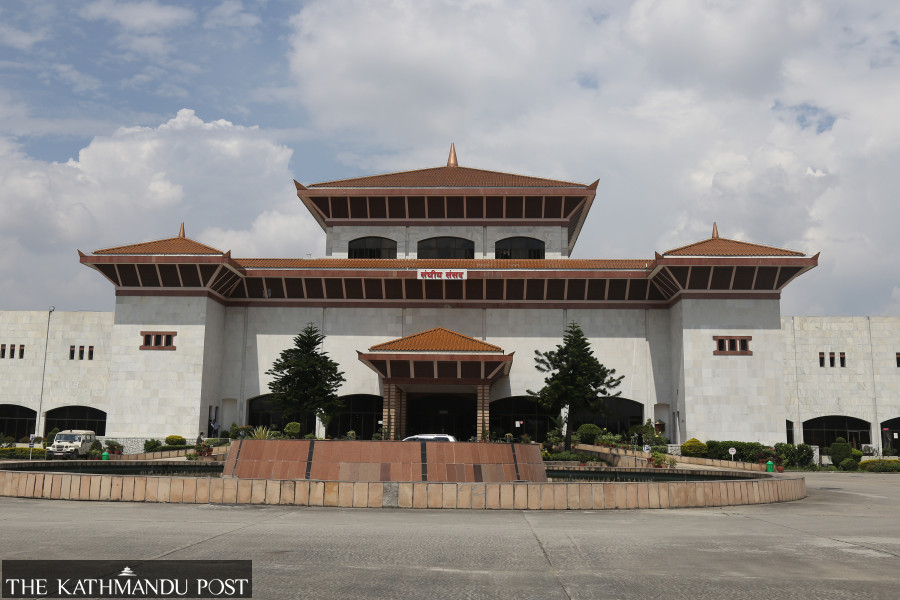National
Light Feb calendar belies government pledge of more effective Parliament
Two ruling parties’ events clash with the House of Representatives’ schedule.
Binod Ghimire
For those believing in the government’s repeated claims that the new session of the federal parliament would be productive, the calendar for the winter session could disappoint.
The House of Representatives calendar for February shows it will sit only seven times in the month, including the inaugural meeting on Monday. Six other meetings—on February 7, 18, 22, 23, 25 and 26—will be held over the next three weeks.
Except for the anti-money laundering bill, no other bills will be endorsed by the lower house this month. The winter session, also called the bill session, will last a maximum of three months.
If the meetings are held at the present pace, only 20-21 meetings will be held in the entire session which wouldn’t be enough to endorse around three dozen bills the government is planning to push through.
Officials at the Parliament Secretariat say lack of adequate business, the political campaign of the Nepali Congress and the statute convention of the CPN (Maoist Centre) are the reasons only seven meetings are scheduled this month. The country’s largest party is busy with the “Samudaya ma Congress” (Congress in Communities) campaign from January 30 to February 9. The party’s second-rung leaders, who also are the lawmakers, are busy in the cross-country campaign.
Similarly, the ruling Maoist Centre is holding its three-day statute convention in the Capital from February 13.
“We hope to bring a tight schedule when the second calendar will be published for March,” Ek Ram Giri, spokesperson for the secretariat, told the Post. “We also expect parliamentary committees to hold intense discussions on the pending bills and send them to the full House this month. It will keep the House busy.” Around two dozen bills are being discussed in the committees under both Houses.
Ever since the first meeting of the House in January last year, other than the mandatory budget-related laws, Parliament has endorsed only one other bill related to criminalising usury. This is why the government hopes to make the present session more productive.
“Our priority is to register and endorse the maximum number of bills,” Prime Minister Pushpa Kamal Dahal, said after the House meeting on Monday. Two weeks back, the Ministry of Law, Justice and Parliamentary Affairs, after consulting different ministries, had revealed that the government was working on 109 bills. Talking to the Post, a ministry official said they expect around 35 bills to be registered in the Parliament with the commencement of the new House session.
However, the government so far has registered only two bills in Parliament targeting the new session.
Padam Giri, CPN-UML chief whip, said the government has told the House it will have no dearth of business starting next month.
“We all want to make this session productive but it is the main responsibility of the government to make sure enough bills are registered and the House functions smoothly,” he told the Post. “As we have less than three months before the budget session, we should make sure a maximum number of bills are endorsed in this period.”
It is a constitutional obligation to present the national budget on Jestha 15 (May 28 this year). As the pre-budget discussions need to be concluded 15 days prior to the presentation of the fiscal budget for 2024-25, deliberations have to commence latest by May 7. Rule 145 of the House regulations says pre-budget discussions must be completed 15 days before the budget presentation. That means pre-budget discussions must conclude by May 13 so that the budget can be presented on the constitutional date.
Similarly, the government’s policies and programmes that the President presents need to be approved by the House before the finance minister reads out the national budget. The current session must be prorogued, and there should be a few days before the budget session is called.
Experts on parliamentary affairs say it is the government that needs to understand the urgency of the matter. Rajendra Phuyal, former secretary of the National Assembly, said the Speaker of the House and the Assembly chair can only facilitate the parliamentary proceedings but it is the government’s responsibility to create an environment for deliberations and endorsement of bills.
“The government hasn’t unveiled a concrete plan on which bills would be presented when, which bills it wants to get endorsed and how. I don’t see Parliament becoming very productive without the government’s proactive role,” Phuyal told the Post.
Phuyal, citing the events of the Congress and the Maoist parties that clash with Parliament’s calendar, said when the House is in session, it should be the prime focus of the parties. “Sadly, we see Parliament isn’t the first priority for party leaders and lawmakers.”




 13.12°C Kathmandu
13.12°C Kathmandu














